Geology’s Senior Research Saturday 2018: Standing Room Only
The 3rd Saturday in April is a big day in the William & Mary Geology department as it is Senior Research Saturday, a day in which the Geology seniors present the results of their thesis research to our departmental community and the public. The day-long symposium includes oral presentations, some lively question-and-answer exchanges, a catered lunch from The Cheese Shop, and after the last talk was finished we celebrated with bubbly refreshments.
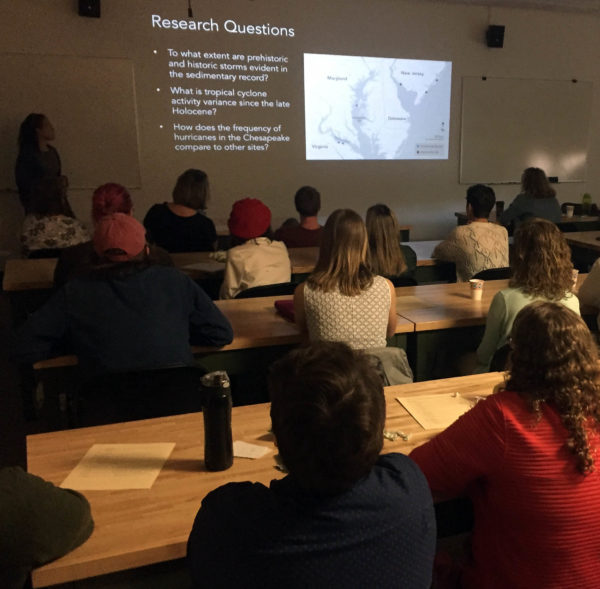
Meagan Cantwell discusses her research questions with an enthralled audience at Geology’s Senior Research Saturday.
The class of 2018 has done compelling research on a broad range of topics and in a variety of places. I’ll highlight just a few, but you can view the entire program. Kendall Rosenberg studied earthquake-generated sediment plumes in Alaska’s Prince William Sound, Jiayi Zhang considered the impacts of road salt on watersheds in Williamsburg, Jake Seefeldt examined the north-to-south flexure along the Pleistocene Suffolk Scarp, Sofia Delzell worked out the paleoclimate secrets held in a Norwegian lake core, and Lauren Visokay completed a structural geology study at the base of the Oman ophiolite.
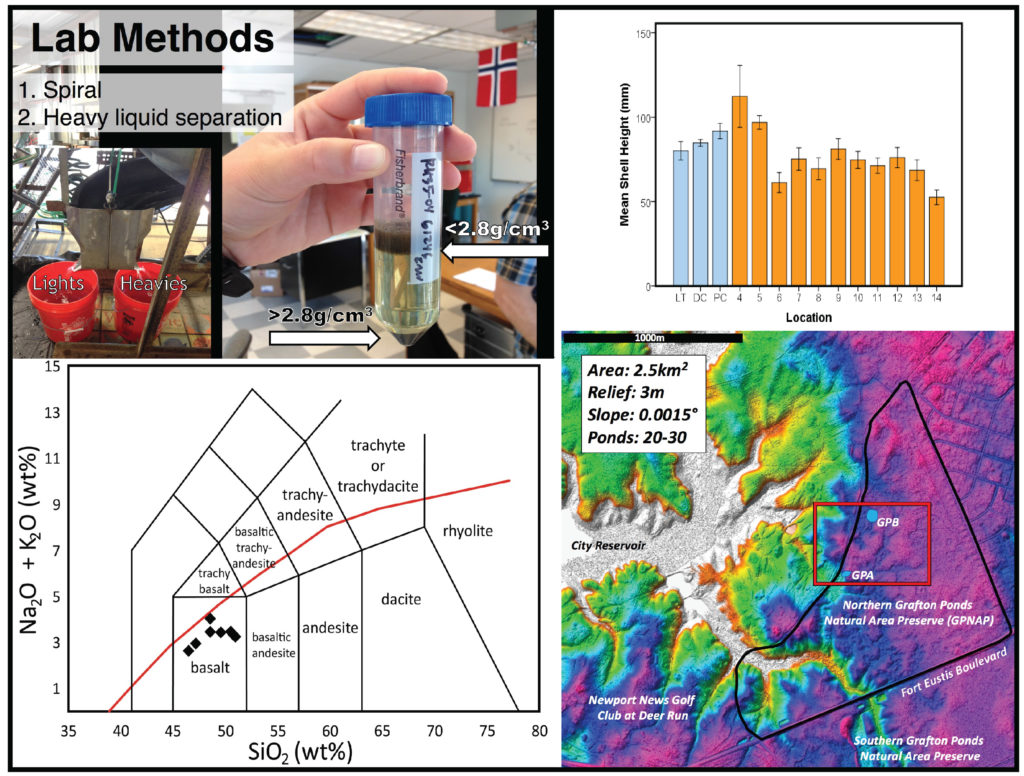
A montage of imagery from Geology’s Senior Research Saturday presentations. Clockwise from the upper left corner. Eleanor Worthington’s lab methods for separating heavy mineral sands. Forrest Sprouse’s oyster shell height data from multiple sites in the Mid-Atlantic region. Jimmy Van Hook’s shaded relief map from his Grafton Pond study site in Newport News, Virginia. Daniel Ray’s total alkali vs silica plot for amphibolite xenoliths in the Petersburg batholith.
Geology is one of the only departments at William & Mary that requires its majors to complete a senior thesis based on independent research; it’s a big undertaking for both the students and their faculty advisors. Yet for more than four decades, William & Mary geology students, as part of their Senior Research projects, have been contributing new knowledge about the earth and its environmental systems. It’s both a remarkable and rigorous capstone experience for Geology majors.
Over the past five years, attendance at Senior Research Saturday has vigorously grown. McGlothlin-Street Hall room 219 comfortably seats 40, but our crowd averaged between 50 and 65. For much of the day, it was standing room only. The room was filled not just with Geology students and faculty, but with friends, parents, and people from the Williamsburg community.
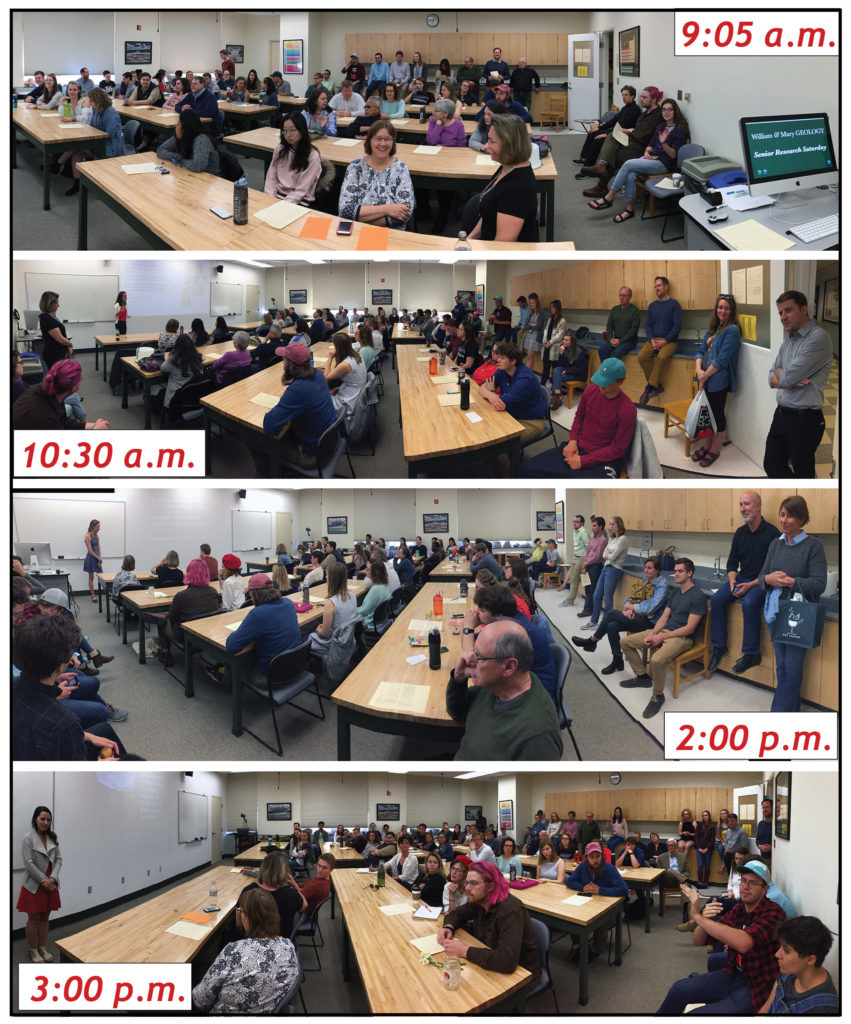
Standing room only in McGlothlin-Street Hall’s room 219 during Geology’s Senior Research Saturday 2018.
Parental units traveled from Colorado, New Jersey, Maryland, and even the far-traveled, and exotic, Goochland Terrane to see the show. The geology students were explaining their science to English, Government, and Music majors and, in many cases, to their parents, siblings, and grandparents – that’s a diverse audience. There were even lawyers in attendance as William & Mary’s president Taylor Reveley dropped in to learn about the intricate inner workings of the Earth.
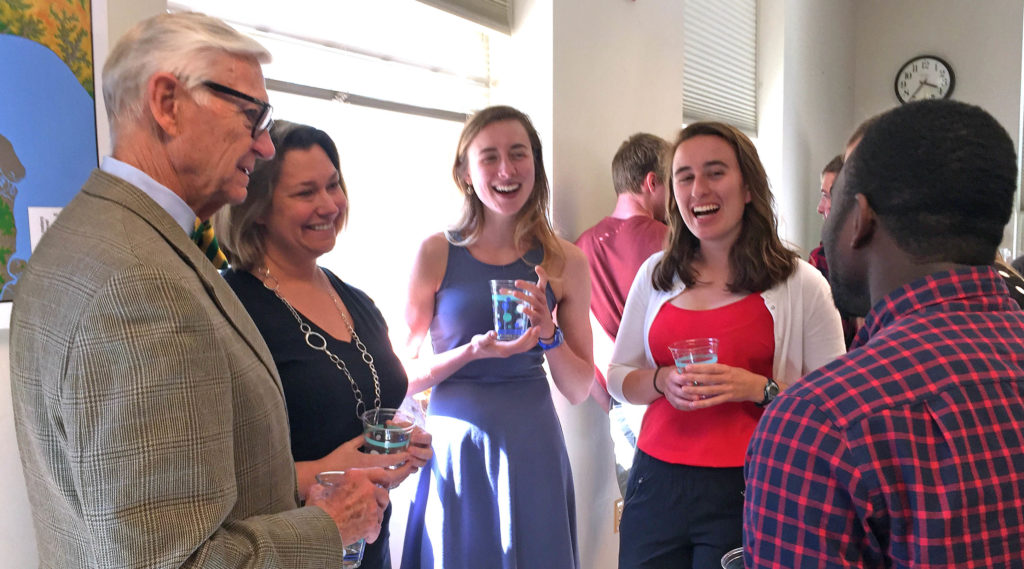
Sharing a moment at Geology’s Senior Research Saturday after party. From left to right – President Taylor Reveley, Professor Rowan Lockwood, and geology seniors Sophie Delzell, Lauren Herbine, and Korede Olagbegi. Photo by Heather Macdonald.
It was a grand day – a typical Geology Senior Research Saturday.
William & Mary’s new College Curriculum (aka the COLL) is billed as a wonderful and forward-looking interdisciplinary curriculum that permeates every year of a student’s William & Mary experience. The Geology department’s 4-credit Senior Research project will count as the COLL 400 requirement for Geology majors. The COLL 400 requirement is intended to be a capstone experience (COLL 400) that will require students to take initiative in synthesis and critical analysis, to solve problems in an applied and/or academic setting, to create original material or original scholarship, and to communicate effectively with a diversity of audiences (text from the COLL 400 website).
The Geology department’s thesis requirement and its Senior Research Saturday existed long before the new curriculum was hatched, but the collective Geology undergraduate research experience seems a perfect fit for W&M’s ambitious COLL 400 capstone.
However last summer, the chair of the Educational Policy Committee indicated that Geology’s Senior Research Saturday does not qualify as an experience that requires students to communicate effectively with a diverse audience. He suggested Geology follow the lead of other departments, who in their capstone seminars (which may or may not include original research), are opting to have students write blog posts or non-technical abstracts to satisfy the COLL 400 requirement.
When told that Senior Research Saturday did not pass muster for the COLL 400 requirement, geology seniors were a tad incredulous, but nonetheless eager to write their non-technical abstracts which will certainly be For the Bold!
Perhaps next year, members of the Educational Policy Committee will come experience Geology’s Senior Research Saturday, and determine for themselves whether it qualifies as effective communication that reaches a diverse audience.
Comments are currently closed. Comments are closed on all posts older than one year, and for those in our archive.

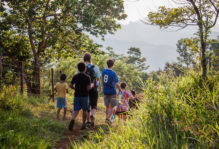
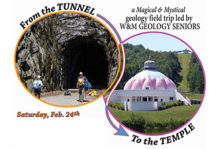
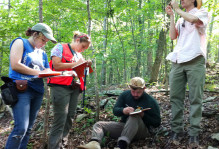
Wow, yeah, you’d think someone would evaluate it in person before deciding that the event didn’t qualify. Cool to see the prez there!